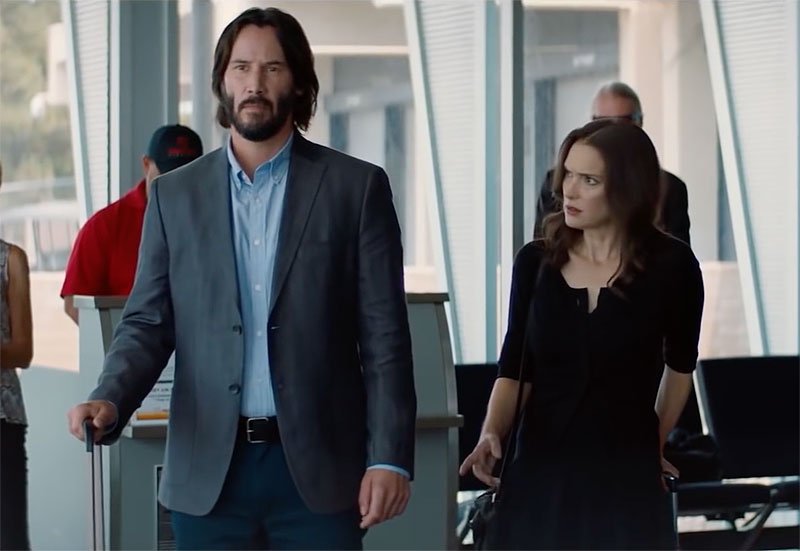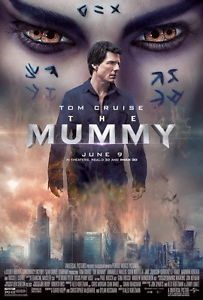Vox Lux
Brady Corbet’s film is a strange animal, a drama about a pop star that’s also a treatise on fame and the responsibility of art to inspire both violence and healing. Not all of its ideas work, but it deserves kudos for what it tries to do more than what it succeeds at.
The film is a diptych, with an omniscient narrator (Willem Dafoe) who isn’t a character onscreen. This kind of a voice-over is mostly used as a crutch for lazy screenwriters and doesn’t generally work—here it’s partly effective. The narrator offers expositional information the film doesn’t provide any other way—though you might wish it did—and his voice gifts the film with a literary conceit, and helps make explicit Corbet’s authorship. As part of his directorial arsenal, and for a story as idiosyncratic as this, there’s an argument to be made for it.
The first half of the film shares the rise of Celeste (as a teen, Raffey Cassidy), who, when she and her older sister, Ellie (Stacy Martin), survive a school shooting, Celeste captures the imagination of the nation with a song she composes and sings, and then finds a manager (Jude Law) to sculpt her career. Flash forward 18 years, and Celeste (now Natalie Portman, in a mode not unlike who she played in that famous SNL rap skit) is famous, petulant, and damaged. Ellie’s still a part of her entourage, as is Celeste’s daughter, Albertine,
The casting is the film’s biggest mistake, and it capsizes the whole picture. Somehow, Corbet thinks it’s OK to have two actors play Celeste, but only one to play Ellie, which is both confusing and wrong-headed. Then he compounds the mistake by having Raffey Cassidy play both the young Celeste and Celeste’s daughter, Albertine. It makes you wonder whether he swung a deal with Cassidy’s agent to ignore the union rules and only pay her for a single role, thereby saving the production money, on top of the cash he saved by not recasting Ellie over the almost two decade jump in the narrative.
It’s a shame, because his decision undercuts both the performers, who are otherwise solid, and his own thematic investigation into the cost of glamour and the creative life.
Late in the running, he has his star go on stage and perform, to somehow express that all her suffering was worth it because of what she’s able to give to people through her music. It doesn’t work, and despite Portman’s commitment and songs written by Sia, Vox Lux ends feeling strangely faux.
On The Basis Of Sex
When I watch biopics I often ask myself a question as a kind of quality test: “If this person’s story was presented as a documentary, would it be more engaging?” In the case of On The Basis Of Sex, I don’t have to wonder, since RBG exists. That’s the better-than-solid documentary on how Ruth Bader Ginsburg changed the American legal system. The feature film lives in the shadow of the much better doc, especially out of the blocks when it tries to interest us in her personal life. It crackles, briefly, when it finds its feet as a legal drama.
It has a lot to overcome before it gets there. Mimi Leder, probably still best known for directing Deep Impact, the less commercial (though better) giant asteroid movie the year there were two of them, starts with RBG (Felicity Jones struggling with Jewish Brooklynese) at Harvard in 1956. There she fights against the entrenched patriarchy when her fellow law-student husband, Martin (Armie Hammer), takes ill. This whole section should’ve been cut—all it does is show how Bader Ginsburg managed to attend all of her classes, and her husband’s, too, while never breaking a sweat. It fails to make us care about her struggle. I immediately wondered if I had caught up with all the episodes of the new season of The Good Fight, and thought of all the ways that show is better than this.
Then we jump into the 60s, where Bader Ginsburg struggles to find work at New York law firms despite graduating at the top of her class—sexism again. She becomes a professor—teaching classes full of suspiciously attractive and well-coiffed young people—and in the 1970s, takes on one of her husband’s tax cases, Morris v Commissioner, the first of her efforts to confront and overturn a law that discriminates on the basis of sex. It’s here, in the second act, that the picture finally comes to life. Jones gets a chance to bounce off her precocious daughter (Cailee Spaeny), the ACLU’s Mel Wulf (Justin Theroux with an awful fake tan), and her legal hero, Dorothy Kenyon (Kathy Bates, who shows up, barks, and then vanishes), all of whom lift the proceedings. As she learns about arguing in court, we learn along with her, and that helps.
Eventually, in a truncated third act, RBG gets to argue her case underpinned by a conventional, syrupy score reminding us how to feel. One decent act out of three a good movie does not make, but for hardcore acolytes of the great lady, there might be enough here. The rest of us should stick to the doc.
Bumblebee
The Transformers franchise has spent more than a decade crushing the box office globally almost entirely without my help or hindrance. I watched the first one, which I didn’t think too much of one way or another, and haven’t bothered with any of the poorly received sequels. I’m too old to have any affection for the original toys or comics, so there’s little nostalgic draw. But this prequel earned a lot of buzz from critics at the end of 2018, so I took the risk of watching it. I found a movie with a heart, but otherwise maybe not as impressive as some have said.
It starts pretty much as you’d expect: giant robots fighting on a their planet Cybertron—the moment where an American teenager-sounding yellow robot, B127, is sent in a rocket off-world like Kal-El, off to our quiet, unsuspecting planet where giant robots don’t fight each other. (To be fair, most of our fighting robots are smaller, vacuum-machine sized.) Why Earth is chosen, why it’s considered a place safe from the aggressive robot overlords, the Decepticons—as John Cena very astutely points out, they don’t sound like a trustworthy bunch—is never explained to any satisfaction. But, maybe that’s asking a little too much.
The yellow robot arrives on our world, but the villainous machines have tracked him to Earth and arrive simultaneously—exactly what the goodies didn’t want to happen. B127 loses both his voice and his memory, but finds a friend, Charlie (Hailee Steinfeld), a California teen still grieving her father’s death while listening to a lot of The Smiths—this is the 1980s, after all. Aside from the cars and the well-chosen soundtrack, there’s not much here to identify the time period. Someone might’ve pointed out to the filmmakers that car alarms weren’t really a thing in the 1980s, but again, expecting era accuracy might be another too-high ask for a Transformer movie.
The best part of Bumblebee is the second act, when the sad, amnesiac robot-that-can-turn-into-a-Volkswagen connects with the sad teen. They quickly become best pals, and there’s a brief and encouraging time when it looks like the picture is going to become a coming-of-age movie, when it directly references The Breakfast Club and Rebel Without A Cause. Pamela Adlon is a welcome presence as Charlie’s mother, and their scenes together have a spark. I hoped Bumblebee might even channel a little of the wholesome playfulness of Herbie The Love Bug. But no such luck—before long the evil robots have shown up and the picture has reverted to type—more giant robot fighting, right through to an end where our friends are parted because the movie is ending, not because it makes any sense that they should.
This is a popcorn movie firmly aimed at a pre-tween crowd who may not be concerned about the frequent plot chasms. I can only assume it earned so many glowing reviews due to the abysmal quality of the franchise films that came before. If Bumblebee soars in comparison, I’m happy for those reviewers. It didn’t help me much.
Destination Wedding
I really wonder what it says about me that I so enjoyed Destination Wedding.
Winona Ryder is Lindsay, and Keanu Reeves is Frank, and they’re off to a wedding in San Luis Obispo. They’re deeply unhappy people. They hate the groom—his brother and her ex—they hate the wedding, they hate each other, and they hate themselves. They get off to a bad start at the airport, and it just gets worse as they go on into the weekend.
What’s interesting here is that there are no other speaking parts in the film—Lindsay and Frank’s ongoing conversation is all we’ve got, so full marks to writer-director Victor Levin (5 to 7) and the two performers that it works as well as it does. Ryder and Reeves have been movie stars for more than 30 years—this is their fourth film together, following Bram Stoker’s Dracula, A Scanner Darkly, and The Private Lives of Pippa Lee—and they’re both as fetching and magnetic as ever. They hold our interest with the ease of experience, even if their misanthropy is more poised, polished, and practised than is entirely believable.
This whole exercise could’ve been painfully stagy and artificial—and based on some of the reviews I seen, some took it that way—but I very much enjoyed the conceit of two miserable people thrown together and finding a common ground despite themselves. In moments it aspires to, without quite reaching, the conversational brilliance of Richard Linklater’s wonderful Before Trilogy, but only if Jesse and Celine had met for the first time in Before Midnight, already soured by life’s disappointments and bad relationships with other people.
The delightful location cinematography and jazzy score helps deliver all of Ryder and Reeves’ heavy lifting. The rafts of zingy dialogue they share, and the inevitable romance—including one of the funniest and chattiest sex scenes I’ve seen in ages—make it all a worthwhile watch.
Or maybe I’m just as miserable as they are.
The Mummy (2017)
Remember back to two years ago, when Hollywood studio Universal Pictures had big plans to build a cinematic universe like Marvel, except with its monstrous properties: Dr Jekyll and Mr Hyde, The Bride of Frankenstein, The Invisible Man, and The Mummy. This was the only film from that dream to see the light of day, and it bombed, to serve as a warning to other studios, presumably. A fatal curiosity gripped me—how bad could it be?
Well, it isn’t good. Tom Cruise is Nick Morton, who along with Jake Johnson’s Sgt. Vail, are American soldiers and sleazebags in Iraq, where instead of fighting ISIS they’re looking to make a buck on the black market from stolen antiquities. They stumble across an Egyptian relic—a thousand miles away from Egypt—the not-actually-mummified remains of Ahmanet (Sofia Boutella), a princess who made an evil pact for eternal power, or something like that. It’s all a little confusing. An archeologist, Jenny Halsey (Annabelle Wallis), seems to be the only character that knows what’s going on. But she’s also working for Henry Jekyll, a truly uncomfortable Russell Crowe.
Those of us who recall the campy fun of the last iteration of this franchise, starring Brendan Fraser and Rachel Weisz, will be disappointed. This is a cross between a slick, ’90s action picture and a zombie movie, but without the thrills of the former or the genuine scares of the latter. Maybe the intent was to find some of the playfulness of say, Raiders of the Lost Ark, but they don’t get anywhere near to Spielberg’s genius. To compound matters Cruise has never seemed more adrift. His character is a genuine douchebag, who mid-movie turns into one of his typical supermen but who we never really warm up to, and nearly all efforts to inject a little humour fall flat. Boutella and Johnson are the only ones here who makes any real impression in the CGI slurry: After Johnson’s character dies, his ghost keeps talking to Cruise, a little like Griffin Dunne and David Naughton in An American Werewolf In London, and Boutella has her typical dancer’s grace. None of it is enough to save this effort, which we should maybe be glad was entombed at the box office.
Under the Silver Lake
The new picture from David Robert Mitchell, director of modern horror classic It Follows, is a very different film—a Los Angeles noir in the style of The Long Goodbye or The Big Lebowski. It wouldn’t be unfair to call it a more coherent Inherent Vice, though it’s still plenty messy. I saw it originally at FIN Atlantic Film Festival and I’m disappointed it never earned a cinematic release in these parts.
Our unnamed protagonist (Andrew Garfield, likeable but slovenly) is on the verge of getting kicked out of his Silver Lake pad but doesn’t do much to remedy his imminent homelessness. Mostly he amuses himself with conspiracy comics and theories and spies on his neighbours, including blonde bombshell Sarah (Riley Keough). She makes a strong impression but subsequently vanishes. That’s enough to get our man following her friends around town, crashing parties, and taking in LA’s peculiar hipster arts scene as it crosses over into Hollywood sleaze.
The vibe here is much more ecstasy-spiked ’90s nostalgia (REM’s “What’s The Frequency, Kenneth” features prominently) than Manson Family, though cults in the Canyon do eventually make an appearance. Mitchell seems as interested in skewering pop and video game culture and the masturbatory obsessions of young men as he is in exploring the tropes of noir, while solid casting and a widescreen, vivid sense of location really carries the film. It’s surprisingly lovely to look at, like a more drugged-out La La Land, maximizing the leafy appeal of Los Feliz, Silver Lake, and Echo Park’s lush side streets and alleyways. He also inserts animated interludes and startling dream sequences. The colours really pop, even in ramshackle low-rent apartments there’s plenty of fascinating visual detail.
While Mitchell pokes fun at the male gaze he also indulges it, for better or worse. In the end, the conspiracy trail leads us to something more ridiculous than satisfying, but the journey is worth the circuitous stroll. This is a tale of secret codes and hidden messages, and no doubt Mitchell’s likely left a bunch of hidden messages in his film, too. Something to reward a rewatch.






















